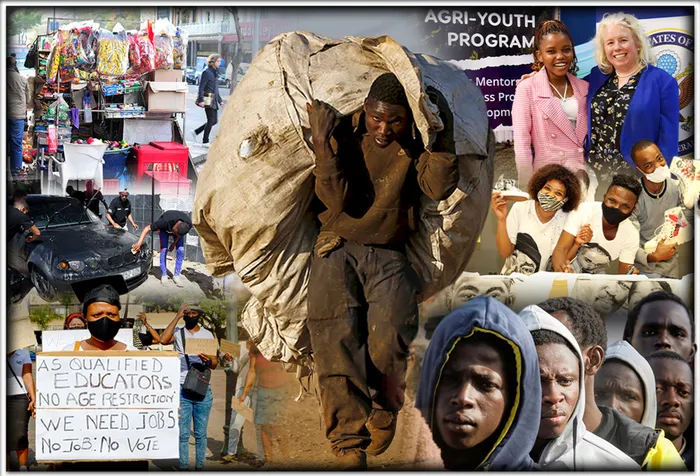MTBPS: Jobs for youth mean dignity, stability

Graphic: Timothy Alexander/African News Agency (ANA) – The only rational mandate cabinet can give the Finance minister for the MTBPS is to make the R350 permanent and universal and create a real employment policy, the writer says/
By Isobel Frye
South Africa’s youth unemployment has grown to state of such dysfunction that it will be a key constraint in any future path that is taken, and it could destroy the fabric of our democratic dream unless sufficiently large interventions are taken immediately.
The only rational mandate cabinet can give the Finance minister for the MTBPS is to make the R350 permanent and universal and create a real employment policy.
South African youth unemployment sits at a staggering 72 percent of people aged 15 to 24, who are not in education. That means only three out of every 10 young folk are employed. While it is perversely reassuring to hear that youth unemployment is a global problem, South Africa needs to look at the figures to see: compared to South Africa’s 72 percent youth unemployment, the global rate is 13.6 percent, while the African youth unemployment rate is 10.6 percent.
And each year, according to the Presidency, about 67 percent of 1 million youth enter the labour market detached from any learning or work.
Unemployment is a corrosive cancer that undermines individual sense of worth and prevents the critical transition from adolescence to adulthood. Decent employment enables people to become responsible parents and provides a creative sea of potential and innovation that supports national growth and profit. Unemployment stops the transmission of knowledge and experience; it essentially deskills a nation. Unemployment is one of the greatest risk factors for any society.
Unemployment creates social friction, particularly in a country where race is a crucial determinant of your life probabilities. Looking at total unemployment across all ages, 11 million black African people are unemployed, compared to around 200,000 white people.
Unemployment also reduces the personal income tax base, although everybody pays VAT at the tills, which means lower revenues for state institutions like schools and clinics – generally for the poor.
Unemployment severs the trickle-down effect that neo-liberals like to talk about. Trickle down of wealth is meant to operate by GDP growth creating jobs and so salaries or wages trickle down into the poorer households that don’t benefit from profit shares of the wealth. But if there is no employment, and no social security income replacement system, there is no income and so there is no money to spend. Poor communities become poorer, shops get shut, and the cancer of unemployment grows steadily and lethally.
According to the ILO’s Programme on Youth Employment, in developing countries up to 75 percent of youth employment is in the informal economy. In Nigeria, that is 95 percent.
Nigeria, with a population of 199 million people has an incredibly high youth bulge. In fact, 72 percent of their population is under 30 years, but just 35 percent of their youth is officially unemployed. The Nigerian Youth Employment Action Plan (2021 to 2024) was developed to address two concerns – to reap the productivity that is lost when people are excluded from the labour market, and secondly, to reduce the risk to national security and development that is posed by a high youth unemployment rate.
South Africa’s dilemma is similar.
The wake -up call for the state woefully seems to have been triggered by National Treasury’s instruction to the rest of government to move the 12.4 million people, who applied for the R350 Social Relief of Distress grant in June 2022, off the grant. It is quite remarkable that the number of unemployed people in Stats SA’s Q2 Labour Force Survey is 12.4 million people.
It is great that the highly positive impact of the R350 grant enabling people to look for work, to start and sustain micro- businesses and to go to school and reduce hunger are noted in some of these discussions, but there are mixed feelings about what is leaking out of the Presidency and Treasury’s closed policy discussions. The secrecy of the process flies in the face of the ILO’s standards of employment policy making – open participation.
From a policy perspective, the principles that need to guide government’s work are clear.
Fundamentally, do not confuse purpose. The R350 grant is less than half of the Food Poverty Line, make it available to everyone, so we know at least that all South Africans are getting some food each day. Those who don’t need it won’t claim it. SARS can find the space to pay for it in a variety of ways that includes stopping illegal profit shifting overseas, reaping commodity price gains, introducing a wealth tax, and freeing up some of the PIC (Public Investment Corporation) funds.
The need to get people working is indeed critical. But instead of working on threats of taking away benefits for not meeting conditions, use incentives instead, as the private sector does. Reward compliance with more: transport and book subsidies to finish studies, advice centres for people needing CVs and skills advice, access to innovation hubs for micro-entrepreneurs, mentors who have actually run businesses. Access to credit and markets, advice on pricing and sourcing and finding a unique pitch. Growing the micro to become small who will then employ others and feed into the tax base.
But all of this depends on a stable society, and that depends on seeing people as people deserving of dignity and recognising their rights to meet their basic needs. Make the R350 permanent, remove the means test that destroys any incentive for the vulnerable to try to make any other money and start an inclusive employment policy development process.
And for heaven’s sake, keep the lights on!
Isobel Frye is director of the Social Policy Initiative (SPI)
This article is original to the The African. To republish, see terms and conditions.
Related Topics: